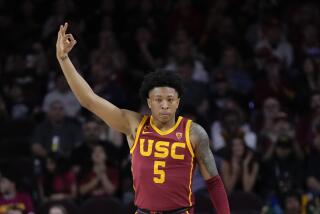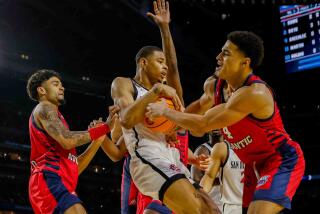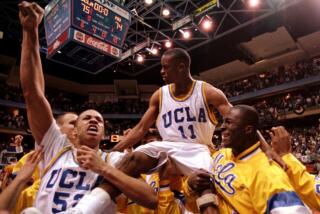Arizona’s Elliott Is Learning the Art of Survival
- Share via
TUCSON, Ariz. — Friday night is fast getting old in the University of Arizona’s McKale Center, so old that it is almost a Saturday morning. More than 90 minutes have passed since the awards ceremony recognizing Arizona’s demolition of Pittsburgh in the final of the Fiesta Bowl tournament, and only two people remain in the Wildcats’ dressing room -- the campus security man who guards the door and Sean Elliott.
Elliott, the 6-8 small forward who is to Arizona basketball what melted cheese is to nacho chips, is standing behind a partition that hides the interior of the room from the hallway outside. His back is to the wall, his head turned suspiciously, like some secret agent cautiously stalking the bad guys, yet not wanting to be ambushed. He is still here because he was interviewed most and showered last, but also because here it is quiet and outside it is not.
“Are there a lot of people out there,” Elliott whispers to the security guard.
“Yeah, quite a few,” the guard says, looking down the hall.
Elliott looks like a man in need of help. The guard offers to secret him out through a back stairwell and hustle him through the parking lot to his car. That wouldn’t work; Elliott’s family and friends are waiting, too. He frowns, innocently and resignedly. “No,” Elliott says. “I’ll just do it.”
Outside, perhaps 50 people have waited past midnight for the most famous athlete in Tucson. A small girl in a red “U of A” sweat shirt reaches out and Elliott hoists her skyward. She cries. A woman at least 60 years old opens an off-white winter coat and asks Elliott to sign the lining. He does and she says, “I’ll never wash it.” There are dozens of others who wish only the ordinary autograph.
Kevin O’Neill, an Arizona assistant coach and close friend of Elliott’s, says, “He can’t go anywhere in this town without signing 200 autographs. He and I went to Safeway one night to buy ice cream, and somebody wanted his autograph.”
And to think, Elliott postponed for a year his NBA career and returned to Arizona because he didn’t think he was ready for the mature demands a professional lifestyle places on a 20-year-old. Now he is at the center of the universe. “Sometimes it’s getting to him,” teammate Anthony Cook says. “He’s just got to take his phone off the hook.”
It could be no better than it was last March. Local hero, all-America, future millionaire ... all wrinkle-free. Sean Elliott sailed for three years on a placid sea, culminating last spring with a berth in the Final Four on an Arizona team that went 35-3. He was the best player on the team, averaging 19.6 points, 5.8 rebounds and 3.6 assists, yet bore no star-quality pressure. Most of that was deflected by Steve Kerr, the blond-haired, Dean’s list point guard with the heart-rending background.
Elliott’s plan was in place: Win the national championship, enter the NBA draft a year early and open some serious bank accounts. He deserved it. “I would not have come back,” Elliott said, “if we had won the national championship.”
The Wildcats didn’t, and almost instantly, the walls started closing in. He decided to turn pro, anyway. Then he changed his mind. He would play on the Olympic team. Then he got cut. He would spend a final year at Arizona, in college, in the sanctuary of classes and cafeterias and hold the big, bad world outside at bay for another season. But college had changed. Kerr is gone and Elliott is the star, the threat of injury follows him through every practice (he has a $1-million insurance policy protecting him, though he would make many times that in an NBA career), and opponents such as UNLV’s Stacey Augmon and Stanford’s Andrew Vlahov bully him about, probing his reputation for softness.
He is surviving and more, averaging 22.4 points, 7.7 rebounds and 4.2 assists. He will duel into March with Duke’s Danny Ferry and Oklahoma’s Stacey King for Player of the Year honors. Arizona is ranked No. 4 in the country. But in the year he passed up the NBA, college basketball has become less play and more work.
“I get a lot more tense than I used to get last year,” Elliott said. “I was a junior then, and there wasn’t as much pressure on me. Nobody expected that much of the team. I guess it was just a game then.” When two friends from high school visited Elliott in September, their first wish was a game of pick-up. “Not me,” Elliott told them. “In my free time, I do not play basketball.”
But if life is different, Elliott is much the same: convivial to a fault, unselfish on and off the floor, “Basically, everything he seems to be, he is,” O’Neill said. And as the literal and figurative cornerstone of Arizona basketball -- “The program is visible because of Sean,” Wildcats Coach Lute Olson said, “Sean isn’t visible because of the program” -- he acts with public dignity, signing those autographs, visiting those YMCAs, et. al.
And if it is all less idyllic this winter than last, Elliott can point to four decisions. Not wrong, just tough.
Decision No. 1: To stay in Tucson and play for Arizona. Elliott was a star at Cholla High, “But I always wanted to play at one of the schools I saw on TV on Saturday morning, like North Carolina or Virginia. Nothing was happening here.” Olson convinced him something would. Anywhere else, Elliott would be a star, but having stayed home, he is an idol.
Decision No. 2: To stay in college. The night after Arizona lost to Oklahoma in the national semifinals, Elliott decided to turn pro. He told O’Neill about it and they talked. Later he talked with Jerry West and Michael Jordan. The money tempted him. “I was Christmas shopping,” Elliott said, “and I had $30 for my brother, and $20 for somebody else. I was thinking if I did something else, I could buy my mother a new house, buy my brother a car.” But the lifestyle frightened him more. “I had a lot of reservations about stepping into that type of world.”
Decision No. 3: John Thompson’s, not his, to cut Elliott from the Olympic team. “I think one of the reasons he let me go,” Elliott said, “was because I was so laid-back. I’m not the type to be throwing elbows and talking to people. I don’t know if that’s what he wanted. I think he wanted me to score more, be more selfish. That’s just not me.”
Partly, it is now. This season, UNLV, North Carolina and Stanford have all tried to intimidate Elliott, verbally and physically. “He’s been giving it right back,” Cook said. “He hasn’t been backing down.”
Decision No. 4: The insurance policy. To protect himself against injury, Elliott and his mother, Odiemae, took out a $1 million policy with Sports Underwriters of Houston, which pays off if Elliott is injured and cannot play in the NBA. The premium, Elliott said, “is a lot of money. You can imagine the kind of debt my mother is in with that.”
The next decision is no decision -- to draft Elliott. He will probably be the first player chosen and, barring injury, will command far more than the roughly $750,000 he was worth last year. One problem: He still wears a brace on his left knee, which was injured seven years ago and has recently been pronounced sound by several doctors, including those who authorized his insurance policy. “That brace is going to be a negotiating tool for whatever team drafts him,” Olson said. “They’ll examine him and they’ll know it’s sound, but they won’t tell him they know it’s sound, if you know what I mean.”
Arizona has asked Elliott to play without the brace. He did once, as a sophomore, playing a game at San Diego State. His mother watched the game on television. “When we got back to the airport,” Elliott said, “she had an earful for everybody.” And be certain, his mother’s is a voice that Elliott listens to.
The brace is purely a financial matter. As to Elliott’s potential as a pro, the consensus is that he can’t miss. He has quickness, both on the floor and leaving it, and consistent 20-foot range. The scuttle-butt is that somebody will try to make him a point guard, but West said, “I see him more as a shooter. But he’s going to be a real solid player in the NBA.”
First, though, the matter of draining the last drops of innocence from Arizona. That’s why he’s here. “I can’t waste even one day in practice,” Elliott said. “This is my last chance to play college basketball.”
More to Read
Go beyond the scoreboard
Get the latest on L.A.'s teams in the daily Sports Report newsletter.
You may occasionally receive promotional content from the Los Angeles Times.










